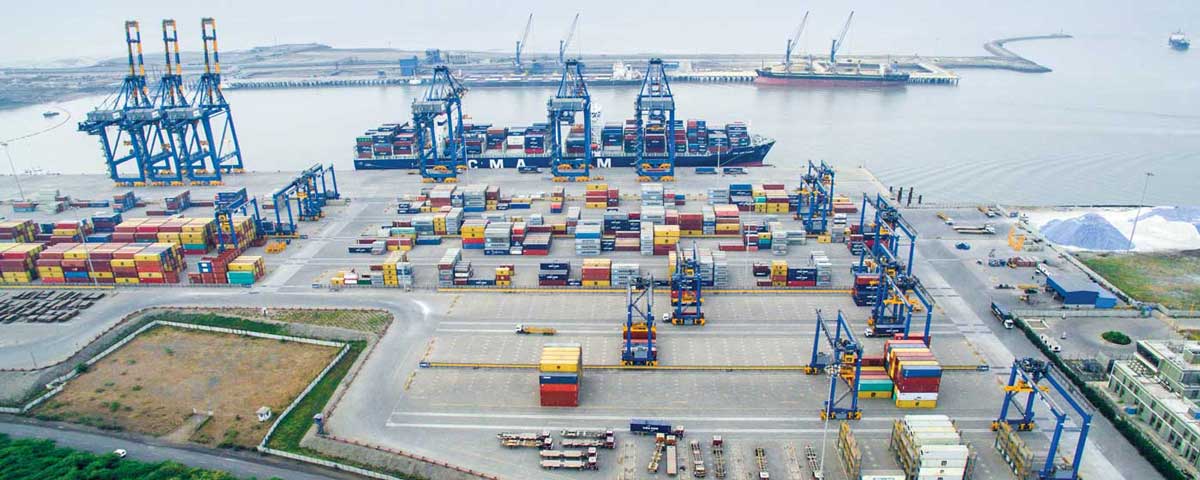The Adani Hazira Port has successfully resolved the dispute concerning an additional levy it had planned to impose. Three long-established container freight stations (CFSs) serving Hazira Port have now agreed to adhere to a new service level agreement. This agreement requires them to promptly clear containers nominated by shipping lines within specific timeframes, subject to charges in case of deviation, as per the prevailing terminal tariff.
Under this revised agreement, the window for container clearance has been set at 6 days for exports and 4 days for imports at Hazira Port. Should the CFSs fail to meet these agreed-upon timeframes, they will be responsible for the charges specified in the terminal tariff. This resolution was communicated through a revised advisory issued by Adani Hazira Port.
In a previous customer advisory dated August 25, Adani Hazira Port had announced its intention to levy additional charges of Rs 2,500 for a 20 ft container and Rs 4,000 for 40 ft and 45 ft containers when import-loaded containers were taken to a CFS as designated by the shipping lines. Additionally, CFS operators were instructed to maintain a Pre-Deposit Account (PDA) balance at the terminal starting from 8th September to facilitate invoicing for CFS nomination charges related to import-laden containers.
As of September 10, Adani Hazira Port had halted the delivery of import-laden containers to the CFSs servicing the port, a move that had been met with strong opposition from the CFSs and other stakeholders, including importers relying on Hazira Port for shipping their cargo.
The resolution of the standoff involved consultations with all stakeholders, leading to the port operator's issuance of a revised advisory. According to this updated advisory, CFSs operated by Hind Terminals, Seabird Marine Services, and Kribhco Infrastructure (owned by Dubai's D P World), which have a long-standing presence at Hazira, will abide by the new service level agreement. This agreement entails evacuating nominated containers within specific timeframes, with charges for deviation as per the prevailing terminal tariff, subject to periodic amendments.
Adani Hazira Port emphasised that this arrangement is aimed at ensuring there is no additional cost to trade, as feared by stakeholders. Instead, it seeks to enhance efficiency and reduce unproductive costs to accommodate increased cargo volumes.
All other CFSs, including future ones, will be charged based on the actual services provided by the port, as per published rates that may be amended from time to time. This includes Hazira Container Freight Station (supported by A P Moller-Maersk) and an upcoming CFS by Sarman Ports.
The decision to revisit the August 25 trade advisory was prompted by multiple representations from shipping lines, container freight stations, Custom house agents, Customs, and EXIM trade. The port operator pointed out that the monthly handling of over 70,000 twenty-foot equivalent units (TEUs) at Hazira Port posed various challenges related to stackyard, equipment, and manpower, resulting in multiple shifting operations.
To address these challenges and maintain high efficiency in shore and yard operations while minimising multiple shifting, a new business model was proposed for the port and other stakeholders, especially CFSs. The Container Freight Stations Association of India (CFSAI) expressed its willingness to support this effort to handle the monthly cargo efficiently and reduce operational costs.
The dwell time for export containers is 7 days, and for import containers, it is 4.41 days at Hazira Port, according to the NICDC Logistics Data Services (NLDS). To enhance cargo handling efficiency, it was suggested that reducing the dwell time for both cycles would be beneficial.
To facilitate the faster evacuation of nominated containers from the port and create additional yard space, the window for both export and import cycles has now been fixed at 6 days and 4 days, respectively. CFSs failing to meet these timelines will be subject to charges in line with the terminal tariff.
Recognising the need for a service level agreement between the port and the CFSs, Adani Hazira Port emphasised the importance of better resource deployment and synergy in evacuation operations. To address these issues and streamline cargo evacuation, a coordination committee comprising port and CFS representatives will be established.
Adani Hazira Port also highlighted its efforts to implement new technology solutions, including the Navis Terminal Operating System, Paperless Entry, and Window Booking. These initiatives are expected to improve operational efficiency and reduce turnaround times, benefiting both the port and the CFSs.
The existing port infrastructure faces limitations in accommodating multiple CFSs, necessitating the dedication of separate yards for each CFS using a "Best Pick Model." With two additional CFSs receiving Customs clearance to commence operations, the strain on operations and infrastructure has increased significantly.
In response to concerns raised by the trade and to maintain the supply chain, the port has modified its advisory regarding additional operational costs. It is now applying charges on a case-by-case basis, considering the unique circumstances and needs of each CFS, both existing and new.





















